
On 2nd April 2024, the Director of National Intelligence of Sweden, Dag Hartelius, gave a presentation in the IFRI, as part of the European Intelligence cycle supported by the Intelligence College in Europe. The topic of the conference was “Hybrid Threats –Tasks and Challenges for the Intelligence Community”.
Ambassador Dag Hartelius, who came to Paris on the 5th March 2019 for the launch of the Intelligence College in Europe, was happy to come back to Paris, for its fifth anniversary, and to participate to this IFRI / ICE cycle. He was the fourth participant of this outreach cycle after Intelligence High representatives from France, Italy and Spain.
Faced with a new type of threat, the hybrid threat, the international community has to respond with new tools that, necessarily, cannot be only military, but will have to combine other variables.
It is not that hybrid threats or elements of hybrid threat did not exist before, think about some Disinformation campaigns during the Cold War, but it was different both in terms of scope and modus. The information revolution and the information overload have given plenty of possibilities in terms of asymmetric and opportunistic attacks against our democratic societies.
Already in EU and NATO, some new strategies and some new tools, such as the Centres of excellence of Riga (on Disinformation), of Tallinn (on Cyber) and of Helsinki (on Hybrid threats), have been developed. But, faced with such wide, opportunistic and asymmetric attacks, we need a new mind set with an “all-the-government” approach.
More specifically, with regard to Intelligence, the evolution has been twofold:
- State services have no more the monopoly of reliable and actionable information. Other sources of information (be it in OSINT or in IMINT) are equally valid, complementary and necessary to understand the current threat situation. We must therefore count on multiple sources that do not necessarily have to come from Intelligence as such.
- We have seen, during the Ukrainian war, the repetitive use of intelligence for STRATCOM purpose. Intelligence, in this regard, is becoming a new tool.
Today we are in a comprehensive ecosystem that requires a cross-cutting, horizontal and holistic vision capable of providing different responses to different threats. The Russian invasion of Ukraine has shown that there is a long way to go in being better prepared to anticipate future threats.
